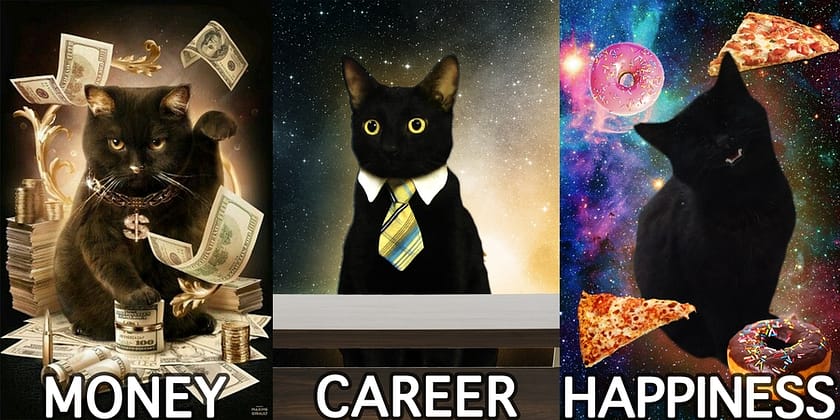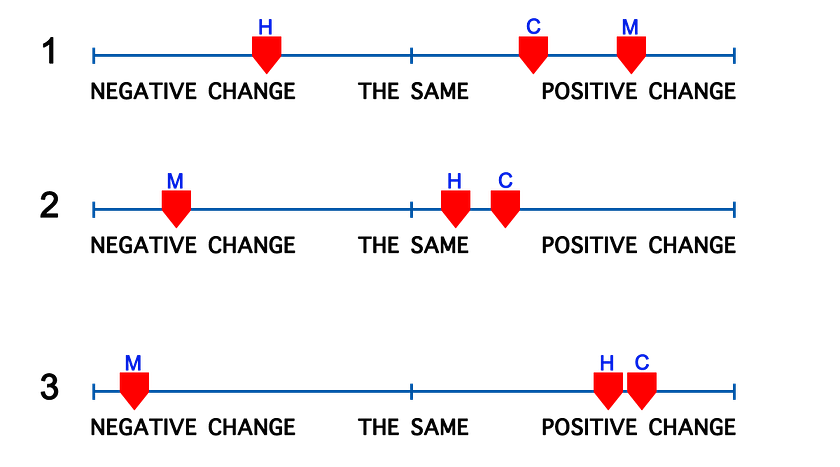A Holistic Approach To Value (with cats)
I get asked a lot, when it might be okay to take a low-paying job, or “sell yourself short”. I have a holistic approach to the value of an opportunity, that includes three forms of “payment”:

I’ll explain how I weigh up these three categories, to determine the value of any job, client, project or gig.
I’m not the only person who takes this approach, Los Angeles-based Assistant Editor Chris Visser notes,
“this all can be folded into “worth”. A job may pay low but have great benefits or be with a connection you really want to make.”
Fellow LA creative August Freirich agrees:
“oftentimes a job’s value isn’t always in terms of money. The gigs that have helped me the most haven’t always paid the best, but they’ve created opportunities for me to grow as a professional and connect with people while moving closer to my long term goals.
Reviewing every job offer solely in financial terms isn’t always the best path to where you want to go.”
Norman Hollyn has a great way of looking at work, he suggests you examine your own needs and skills from an ultra-wide perspective, beyond just the professional. In this interview, he goes into detail about this philosophy. It’s similar to this general approach. These are great ways to determine how happy, and therefore how successful, you’ll be in a particular job.
However, when it comes to happiness, being able to make rent and eat can make a big difference, too. Furthermore, there is a slippery slope when accepting low rates, to seriously devaluing yourself professionally, and your community of fellow creatives.
With trends across the industry towards lower wages, disappearing benefits and shorter-term gigs replacing full-term employment, it can be tempting to take a well-paying, secure job, without considering how it might impact your career or lifestyle. More often, however, we’re pressured into taking lower-paying opportunities, populating job boards with promises like this:
“Seeking rockstar editor, with experience in Avid, After Effects, Color Grading, VFX and Sound Mixing. Action film with A-List leads, excellent resume-builder, IMDB credit. $15/hr”
“Looking for a passionate PROPS MASTER for a low budget feature film for Wednesday to Friday. UNPAID but a great way to enter in the ART DEPARTMENT team. The crew is lovely, close knit and fun to work with.”
“<high-end post facility in New York> seeks Post Producer, must have at least 5 years experience in scripted drama, studio-level productions, and feature films. Full benefits package, salary $35,000”
Or the job this Editor was offered, that had him saying:
“They are offering me, a senior editor, a rate that even a junior editor might be hesitant about… Normally I’d say no, but the project is cool, the director’s work is really interesting and could be a good experience and reel-worthy material.”
We often have to make compromises, the big question is how do we make these decisions, when and to what extent do we compromise, and how do we make sure we’re making the right choices?
I consider every job opportunity, by weighting three scales.
Mo’ MONEY, Mo’ CAREER, Mo’ HAPPINESS
Below is a representation of three different job opportunities. The red markers on the scale are equally-weighted, representing Money, Career and Happiness by M, C and H.
I have considered each opportunity, by whether I would be better off, worse off or the same as my current position (whether that’s a job, a situation, or even if I’m unemployed). By how much would each weight marker move, and in which direction, if I were to take either of these three opportunities?

As you can see, opportunity 2 is not going to be good for me. Opportunities 1 and 3 are going to both make me better off than I am currently. However, considering that all the markers are of equal weight, opportunity 1 is going to tip slightly toward overall positive gains, while opportunity 3 will tip much more in that direction.
For you, maybe your priorities are not evenly weighted. Maybe you’re saving for something important, and need to make Money a heavier weight. You can still do this exercise effectively.
Consider how much each of these markers weighs.

If Money is twice as important to me right now, then the scale for opportunity 3 tips ever-so-slightly toward negative.
For me, the weights change all the time. Right now, in my life, they look like this:

So opportunity 3 would be incredibly attractive, and one not to let pass me by.
Money
There’s more to this analysis than a salary figure. In the US, benefits are a significant factor in the remuneration package to consider. Elsewhere, there are other perks which can improve your financial position such as free gym membership, parking, subsidized transport, childcare or provided meals.
Similarly, costs can make for a less beneficial overall package, such as a longer and more expensive commute, or a strict dress code requiring the purchase and maintenance of a new wardrobe.
Maybe your hours will be shifted later, meaning you’re likely to eat out more times in a week than you do now, because it’s harder to make it home in time to cook. Travel or weekend work can add hundreds of dollars per week to childcare costs, often not balanced out by overtime pay.
It’s essential, if seriously considering a job offer, to do a household budget taking your new job into account. Allow for these incidental costs and benefits, and also use them as bargaining tools during negotiation. A lower rate might not be so low, if meals are provided.
I have personally negotiated things that have saved me money, such as a company-paid gym membership, my phone bill covered, and meals provided whenever I’m required to work outside certain hours. Those benefits can contribute to improving my financial position, even if the hourly rate isn’t much better.
Career
Analyzing whether an opportunity will have a positive or a negative impact on your career is a bit more complex. Obviously, you will have goals, and you can determine whether this is a step toward your goals, or a step away. Sometimes a step sideways is, in fact, a positive move for your career, because as Dom Deguzman explains in Lean Out: The Struggle for Gender Equality in Tech and Start-Up Culture, “careers are not ladders. It’s rock climbing.”
Other considerations are the reputation of the company or your key co-workers, and the likelihood that this job will give you some great additions to your resumé.
Every move you make is just another stepping stone toward where you’ll be in the more distant future. Sometimes the smallest things can have an impact, like a person you’ll be able to meet or impress, or learn from.
An established Editor might take an Assisting job, just to work alongside a legend or hero, to learn from that person and obtain a new mentor. Just knowing that industry legend and making a positive impression could mean that person recommends you to her inner circle, or to productions she cannot take on, therefore giving you a career boost long-term, despite an immediate step down (or across) in this particular opportunity.
The poor reputation of the company or some of your colleagues could have a negative effect on your career, which is equally important to consider. The ethics of the company, or key personnel associated with that company or client, could potentially do harm to your career, based on an effect known as contagion in the business world. Even if you’re personally doing great work on great projects, if you’re associated with a company that is known for disappointing clients, producing sub-par work, or being in some way particularly unethical, that can be bad for your resumé, and follow you around for years.
Positively, another way that a job might enable a secondary career-boost, is one where there is less pressure or more flexible hours. This might allow you the space to up-skill or develop something on the side, bringing you closer to your goals. While a job with much less responsibility might on the surface be a step-down, I’ve chosen to take on opportunities in the past that have allowed me to take classes, write, and develop ideas that have in fact boosted my career, long-term.
Happiness
While we’re all in this industry because we love what we do, there’s more to Happiness than that. The pursuit of happiness is constant and always changing, with each of us having unique needs. It’s important to know what your needs are, what makes you happy, and what makes you less happy. What are your stressors? What sort of lifestyle do you want, and need, to be your happiest self?
Some people have said to me “I’ll be happy if I’m paid well”, and argue that the rest comes naturally after that. I would respond that while studies have shown that poverty, or financial insecurity does take its toll, and that the level by which that is measured varies; overall happiness is not typically gained solely by having more money in the bank. As one researcher on the topic notes, “the relationship between money and happiness is pretty darned small.”
It’s often easier to consider the things we know make us less happy in life, than trying to figure out the things that make us more happy. And it’s not just a case of the things that affect us profoundly, like working with assholes (avoid) or killer robots (also worth avoiding). It’s those seemingly insignificant things, that over a period of time can wear down your happiness. Those little things that make you less happy, versus things that make you more happy.
For me, it looks like this:
|
|
| Working with great people
Working on cool projects that challenge me Being able to work consistent, set hours Being able to get home in time to cook Being respected and valued as a professional A commute that allows for some exercise Opportunities to travel with work Having mentors and role models around |
Working with jerks
Being bored at work, or not challenged Unpredictable hours Working late, less time at home Lack of structure, too much autonomy Not much variation in tasks Having clients in the room while I work Bad coffee |
This is not a complete list, but it’s a few things I do consider when looking at an opportunity.
I also know what things are more essential to my happiness or lack thereof, for example, I can live with bad coffee, but not getting enough time at home to unwind and connect with loved ones during the week will really get me down after a while.
How do I predict the future? Am I making the right decision?
How do I know what the job will be like until I take it?
At what point am I selling myself short?
You never really know how a decision you make will turn out, until you take it and see. But weighing up your choices more holistically will help you be more empowered, more certain, and better-off in general. Considering how an opportunity will affect your Money, Career and Happiness, will help you ask valuable questions in the interview, or negotiate to meet more of your needs and tip the balance of the scales. It will prevent you from ever truly selling yourself short.
Editor Meaghan Wilbur and I were having this discussion recently, she brought up a great point:
“it’s easy to spot inexperienced Producers who have zero skills in storytelling and who also are insecure or afraid. They know they need someone UBER experienced to bail out their ass, and they express this in douchebro hostility during the hiring process.”
It’s inexperienced af to say “3-5 years experience at a high-end house, we are paying $10 an hour”. A savvy and experienced producer would know to avoid words like “rockstar” cuz they know it’s a flag for us…
I would actually sorta respect the cleverness of a producer paying sh*t money but who knew enough to code the ad properly and avoid “ninja rockstar” language.”
There are a few “red flags” in job postings and during the interview process that can give you some insight into what the job will be like- and therefore how it might affect your Happiness and Career, beyond the job description and the answers they give when you query the things that are important to you.
Los Angeles based post professional Hilary Van Hoose listed a few that she looks out for in a job posting:
Doesn’t tell me what kind of content they produce (marketing, corporate training videos, reality, narrative TV, trailers, etc.)
Excessively long and detailed description of the job’s responsibilities, mostly focusing on ways to repeatedly rephrase “attention to detail” and “multitasking.” People who do this are usually extremely uptight and quick to yell at people just to blow off their own steam.
Any use of the phrases/words rock star, ninja, hungry, humble, finger on the pulse of, potential for growth, opportunities for future work, great opportunity. There are a bunch of others… These things usually imply that the job poster expects you to work illegally long hours doing jobs that you’re not supposed to do with little or no pay – and that they’ll treat you poorly.
It is important to me, to not be bored, to have a purpose, direction, and lots to do with clear goals. So I always ask “what might a typical day or week look like, in this job?” If they are unable to answer, it suggests that the job is not well-defined. It also suggests that the hiring manager doesn’t know much about what you do, which can sometimes indicate problems in the workplace and cohesiveness of the team.
How do the people you meet seem? Are they rushed, tense, or relaxed? Are they welcoming and warm? Do they seem happy? Do you enjoy chatting to them? These are the people you’ll be spending a lot of time with if you take the job. You are interviewing them as much as they are interviewing you, be sure to ask questions about the things that are important to you.
How do they respond when you begin to negotiate? Are they respectful? Respect also includes being respectful of your time, not keeping you waiting, and giving you their undivided attention during the interview or meeting.
“A lot of my experience with bad employers starts and ends with a lack of communication” New York-based Filmmaker and Editor Jonathan Hinterberger.
Is the job ad specific, or vague? In creative industries it can be important to work for and with people who have an understanding and respect for all the various things we do, especially those of us who work in roles that are considered “below-the-line”. Watch out for job ads or descriptions that use words and phrases like “multi-tasker”, “evolving role”, “wears many hats”, or “rockstar”. Ask for clarification on that, because often it means that you’ll be required to do much more than you’re being paid for, and often this occurs because the company doesn’t understand the scope of the job you actually do.
I also always ask how long the previous person was in the job, and what they were like. It’s a question that can seem intrusive, but how that question is answered can tell you a lot.
On a production, how smooth the previous stages of the process have gone will always tell you what the experience will be like at the stage you’ll be involved. Minor things can compound and snowball throughout the process of developing and building something creative. If there’s been any level of carelessness, corner-cutting, conflict or delays at any point up-stream, it’s guaranteed to be something that will affect you and your role somehow.
I personally turned down a key role on one of the biggest feature film productions of the past decade because I’d seen it go through a couple of Directors and a lot of complicated, unnecessary delays in pre-production. As I watched my peers continue on, from afar, I knew I’d made the decision that was right for me, as a person who valued her Happiness above her Career at that point in life.
You can also tell how chaotic or organized the company or production is by how they conduct the hiring process. Every little aspect of the hiring process will reflect their production process.
I once was offered two jobs, and had to decide. While each weight was in a different place for each job, the two sets of imaginary scales tipped positive in equal amounts. So I used my self-analysis of what was important, what other aspects of each job could help tip the scales a little further toward positive, as bargaining tools and discussion points.
I asked more questions of the two companies, and friends in the industry, to get a deeper sense of how much better-off I might be in terms of things that might add value to my Happiness and Career at each company. I asked for perks in addition to the offered remuneration to see how my financial position might be otherwise improved until the scales tipped further in favor of one opportunity over the other.
Final Thoughts
So when it comes to taking a lower-paying job, or dealing with industry-wise downward trends in benefits and job security, there’s no right or wrong answer. Taking a job with lower pay that isn’t going to give you positive gains in other areas that matter, will leave you feeling resentful and abused. Sometimes the jobs that pay the least can be the most valuable experiences.
A holistic approach will help you evaluate whether the opportunity is right for you, based on your priorities. It will also empower you to make more informed decisions, and have better negotiating skills.
It might not be possible to get higher rates, but it might be possible to improve your overall financial position in other ways. It might also help you see whether a low-paying opportunity has value to you beyond money, in terms of long-term gains and overall happiness.
As always, if you have questions or have something to add to the conversation, please use the comments below.
-Katie


 Things that make me more happy
Things that make me more happy Things that make me less happy
Things that make me less happy
